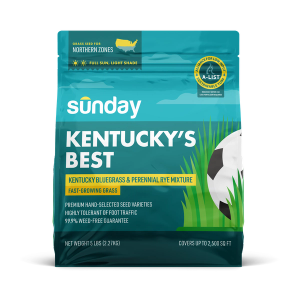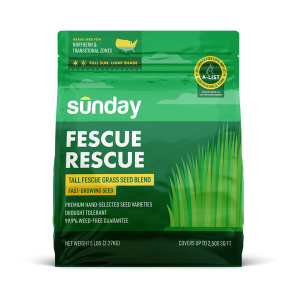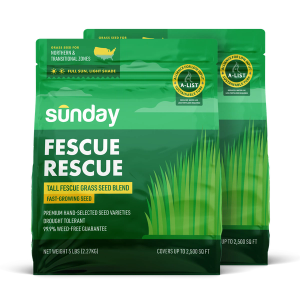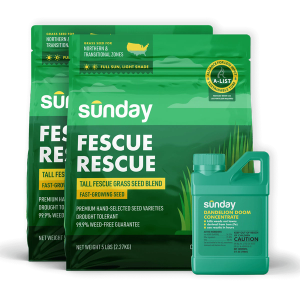Leaf blower & lawn mower pollution
According to the California Air Resources Board (CARB), operating a gas-powered lawn mower for just one hour emits as much smog-forming pollution as driving a Toyota Camry from L.A. to Las Vegas. Leaf blower pollution per hour is even more jaw-dropping—emitting as much as a 1,100-mile drive from L.A. to Denver.
The key culprit for excess emissions? Outdated, inefficient technology. Most consumer leaf blowers and some mowers use two-stroke engines, which burn oil and gas in a single chamber. This makes the machines more lightweight (yay!)—but also makes them spew up to a third of the fuel into the air as unburned aerosol (not yay). These toxic pollutants include carbon monoxide, nitrous oxides, and hydrocarbons linked to cancers, heart disease, and asthma.
Noise-pollution is also a concern. In fact, it’s often the first reason people turn against these tools—which you can probably relate to if you’ve ever been woken up at 7 a.m. on a Saturday by a leaf-blowing neighbor. According to Monica Cardoza, writing for Audubon Magazine, some leaf blowers produce as much noise as a plane taking off! Over time, excess exposure can lead to tinnitus and hearing loss.
But there’s good news! Making a difference is easy—and you can do it in your very own yard.
So…should we ban leaf blowers?
By now you may be wondering, “Should I buy an electric mower or leaf blower?” Or even, “Are electric mowers good?” Many homeowners are reluctant to make the switch for a simple reason: Gas-powered tools generally are more powerful. For professional landscapers or folks with extra-large lawns, that probably matters—but for most homeowners with average lawns, electric tools are plenty powerful to get the job done. If you’d like to make your yard a better place for your health, for biodiversity, and for the planet, there are several simple switches you can make.
Change your tools
Switching to electric mowers and blowers will cause the least disruption to your current routine. You can keep up your regular yard maintenance schedule—the only difference is keeping a battery charged.
Sunday Tip:
Every location is different, but many local municipalities offer responsible disposal services for old lawn care equipment. Check with your local waste services for more info.
Change your techniques
If you’re not ready to shell out for a new leaf blower, that’s OK! You can cut back on pollution AND improve biodiversity by just…leaving the leaves where they fall. You can also choose to simply mow less often, and keep up with mower maintenance to keep it working efficiently.
Sunday Tip:
Did you know that organic waste from our yards makes up as much as 35-40% of landfill waste? It’s a common misconception that letting fallen leaves remain on your lawn will smother the grass. While you don’t want to just leave them in piles, the best thing you can do is mow over them to provide free mulch for your grass! More on that below.
Leave the leaves
While we prefer electric leaf blowers over gas-powered ones, our first choice for dealing with fall leaves is actually a technique that requires almost no work on your part. Leafcycling is a free way to feed your soil by recycling the nutrient-rich leaves that fall naturally! All you have to do is mow over your leaves and let the clippings remain (i.e., don’t bag ’em). Over time, those mulched-up bits of leaf matter will decompose into the soil and feed your lawn. Win, win!
What about leaf litter outside your lawn, in places you can’t reach with a mower? Leave those too! Fallen leaves protect insects, pollinators, and other wildlife that need winter cover for survival.
Where are leaf blowers banned or restricted?
In October 2021, California became the first state to ban the sale of small off-road engines (or SOREs). This includes most residential landscaping equipment and takes effect in 2024. In all, over 100 cities across the country have passed regulations to ban or restrict gas-powered leaf blowers.
Here’s the lay of the land as of summer 2022; always check with your local municipality for more info as laws can change at any time.
CALIFORNIA
Complete gas blower ban: Belvedere, Berkley, Beverly Hills, Carmel, Clarmemont, Indian Wells, Lawndale, Los Altos, Los Gatos, Malibu, Menlo Park, Mill Valley, Newport Beach, Ojai, Palo Alto, Piedmont, Santa Barbara, Solana Beach, Tiburon, West Hollywood
Gas and electric blower ban: Del Mar, Hermosa Beach, Laguna Beach, Manhattan Beach, Santa Monica
Noise and/or time of day restrictions: Albany, Alhambra, Arcadia, Artesia, Burbank, Burlingame, Calexico, Capitola, Cerritos, Corona Del Mar, Costa Mesa, Culver City, Cypress, Dana Point, Davis, Downey, El Segundo, Emeryville, Foster City, Fountain Valley, Gardena, Glendale, Hawaiian Gardens, Huntington Beach, Indio, Irvine, LaCanada, Lomita, Long Beach, Los Angeles, Manteca, Monrovia, Monterey Park, North Hempstead, Norwalk, Orange, Orinda, Palm Desert, Palos Verdes Estates, Pasadena, Portola Valley, Redondo Beach, Richmond, Rohnert Park, Rolling Hills Estates, Sacramento, San Anselmo, San Diego, San Dimas, San Fernando, San Marino, Santa Clara, Santa Fe Springs, Saratoga, Sebastopol, Sierra Madre, Sonoma, St. Helena, Sunnyvale
COLORADO
Complete gas blower ban: Aspen, Carbondale, Westminster
CONNECTICUT
Noise and/or time of day restrictions: Greenwich, Ridgefield
FLORIDA
Noise and/or time of day restrictions: Palm Beach
ILLINOIS
Seasonal gas blower ban: Arlington, Evanston, Glencoe, Highland Park, Lincolnwood, Wilmette, Winnetka
MARYLAND
Noise and/or time of day restrictions: Montgomery
MASSACHUSETTS
Seasonal gas blower ban: Brookline
Noise and/or time of day restrictions: Cambridge, Longport
MICHIGAN
Noise and/or time of day restrictions: Blackman Township, Cassopolis, Kalamazoo, Oakland, Richland, Roseville
NEW HAMPSHIRE
Noise and/or time of day restrictions: Portsmouth
NEW JERSEY
Seasonal gas blower ban: Township of Montclair
Noise and/or time of day restrictions: Princeton
NEW YORK
Seasonal gas blower ban: Bronxville, Dobbs Ferry, Great Neck Estates, Greenberg, Larchmont, New Rochelle, Russell Gardens, Sleepy Hollow, Tarrytown, Thomaston Village, Village of Tuckahoe, White Plains, Yonkers
Noise and/or time of day restrictions: Ardsley, Atlantic Beach, Beacon, Dobbs Ferry, Flower Hill, Huntington, Oyster Bay
NORTH CAROLINA
Noise and/or time of day restrictions: Chapel Hill
OREGON
Noise and/or time of day restrictions: Portland
TEXAS
Noise and/or time of day restrictions: Houston
WASHINGTON
Noise and/or time of day restrictions: Seattle
Cited sources
Fact Sheet. California Air Resources Board.
Cardoza, Monica. Why Cities are Taking Action to Limit Loud and Polluting Lawn Care. Audubon Magazine.
Electric or Gas Leaf Blowers…Neither? Washington University in St. Louis.
Leaf Blower Regulations. HD Supply.




















